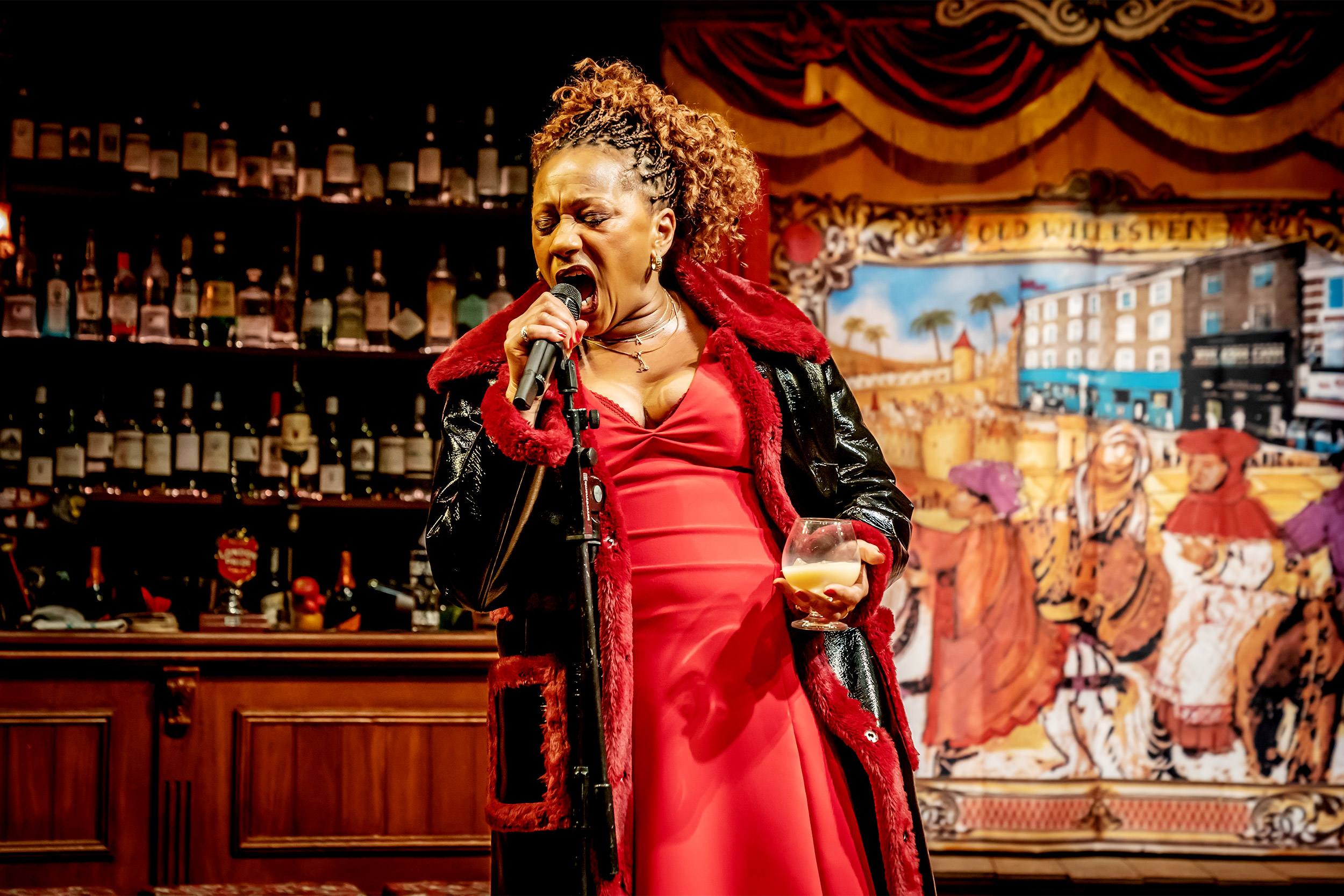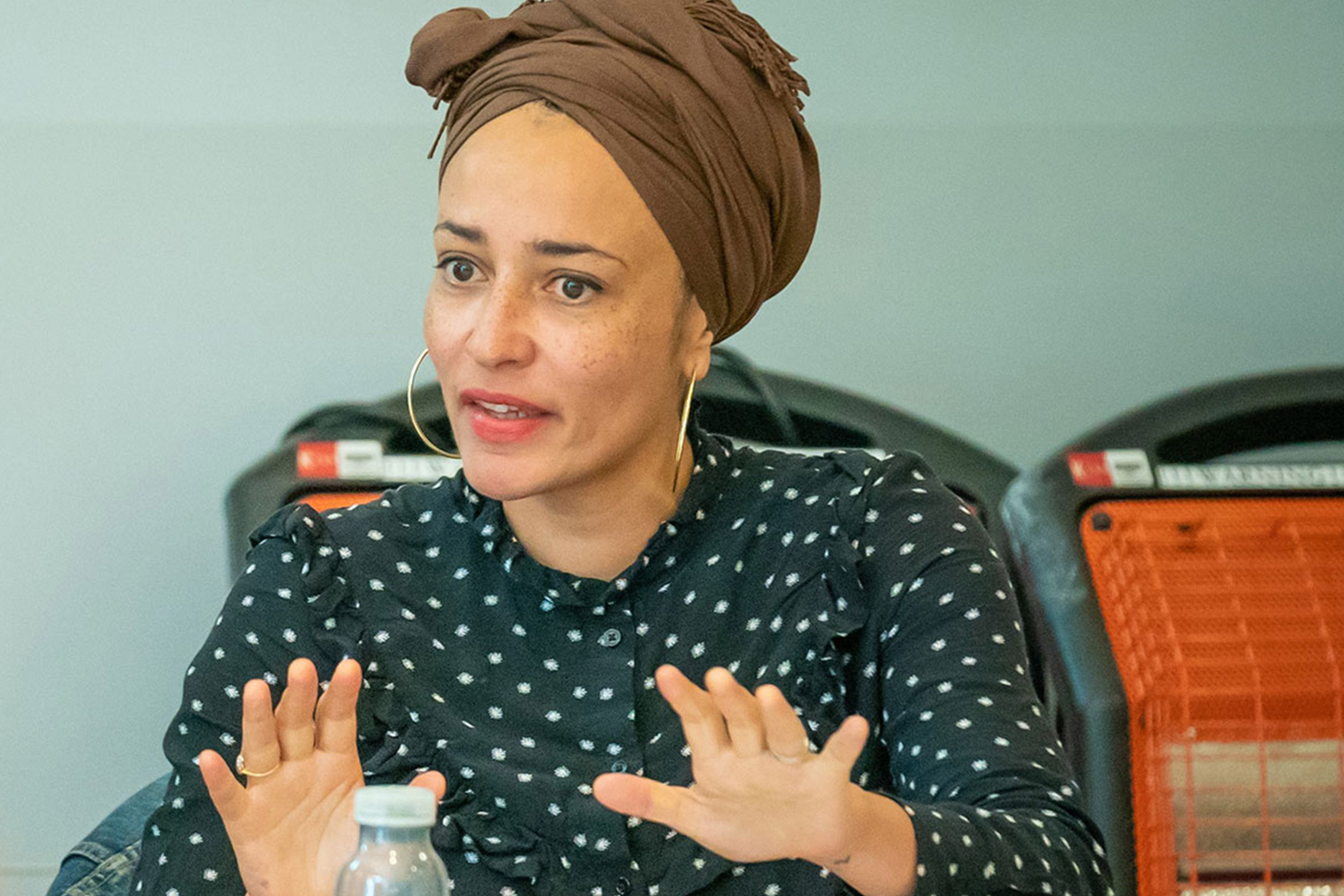
Alvita, the outspoken, bawdy narrator, is played by Clare Perkins in “The Wife of Willesden,” which makes its stateside debut this week at Harvard’s American Repertory Theater.
Photos by Marc Brenner
Old as Chaucer, new as #MeToo
Renowned novelist Zadie Smith’s contemporary reimagining of ‘Wife of Bath’s Tale’ comes to A.R.T.
She’s been married five times, picked up a thing or two about men and women and love and marriage, and doesn’t mind a drink or two, or more (but that leads to other things). And though about six centuries old, there are aspects of her story that feel as relevant as #MeToo.
Two years ago, prize-winning British author Zadie Smith, known for her novels and essays that explore the intersections of race, culture, sex, and class, brought a 15th-century English classic to the stage with her contemporary adaptation of “The Wife of Bath’s Tale” from Chaucer’s “The Canterbury Tales.” “The Wife of Willesden,” which debuted at London’s Kiln Theatre, now makes its way to the States with a run at Harvard’s American Repertory Theater (A.R.T.) starting Thursday.
“The Wife of Willesden,” set in modern-day London, explores themes of the poem such as misogyny, sexuality, and violence against women. It follows the outspoken, bawdy narrator Alvita, who shares tales of her life in Jamaica before she immigrated to the London neighborhood, including her five marriages. Alvita, played by actress Clare Perkins, addresses not pilgrims, but pub-goers, who are as diverse as the real-life neighborhood.
“‘The Wife of Willesden’ is making a real comment about the stories that women tell and about the way that women are and are not believed — there’s a strong ‘Me Too’ movement influence on ‘The Wife of Willesden,’ which is partly picking up the ‘Wife of Bath’s Tale’ in order to show how little has changed in a bad way,” said Anna Wilson, an assistant professor in the Department of English who studies medieval literature, including Chaucer.
Like this new interpretation, Chaucer himself embraced the spirit of innovation.
“When he was writing he was part of an experimental group,” Wilson said. “At the time, what he was doing is actually quite similar to some of the authors coming after him who have tried to break new ground in terms of poetic traditions and histories.”

Smith, the woman at the center of the work, has been praised for her innovation as well. She’s explored different voices, and now, different mediums. She is the author of the novels “White Teeth,” “The Autograph Man,” “On Beauty,” “NW,” and “Swing Time,” as well as essay collections “Changing My Mind,” “Feel Free,” and “Intimations,” and the collection of short stories “Grand Union.”
“The Wife of Willesden” marks Smith’s first foray as a playwright. In the new work she explores writing in traditional verse, while mixing in contemporary language and characters. Having grown up at the intersection of Kilburn, Willesden, and Queen’s Park in London with Jamaican heritage, Smith mixes adaptation with personal biography.
“Chaucer could not have imagined the way we have re-embodied his lines,” Smith said in a statement. “Yet I felt the presence in the rehearsal room, of Chaucer’s humor and bawdiness, his philosophical depth and intellectual perversity. All transformed by the process of passing through these various flesh-and-blood actors, with their human voices and human gestures, with which they are able to perform the miracle of turning text into experience, words into action, ideas into something like ‘life.’”
Smith’s work is being directed by Kiln Theatre Artistic Director Indhu Rubasingham, who took over leadership of the historic theater in 2012. In that time she has produced award-winning projects such as “Handbagged,” which won the 2014 Olivier Award for Outstanding Achievement in an Affiliate Theatre. Having studied Chaucer in school, and now bringing it to life, she beams when reflecting on the way Smith has reimagined the characters.
“The dialogue, the writing is so real. Just like her books do, the characters sing off the page,” she said. “I really love that you’ve got a middle-aged, British Caribbean woman who is complex, who is sexual. And you just don’t see those women on stage.”
She adds that one of the challenges of directing the piece has been communicating the inclusive nature of the writing. Chaucer’s pilgrims, much like Smith’s pub-goers, are pretty distinct personalities but share a sense of community. Rubasingham has attempted to bring the audience into the fold by having some seats actually on the stage, at pub tables, and pub seating sprinkled throughout the audience.
“Having it set in a pub, and that celebration of storytelling and the production that’s in the script, is part of the idea of the audience being part of this world — that we’re all part of the community and sharing this story,” she said.
The curtain will rise on “The Wife of Willesden” at the Loeb Drama Center on Thursday. The play will complete its limited run on March 18, after which it will move to the Brooklyn Academy of Music.




